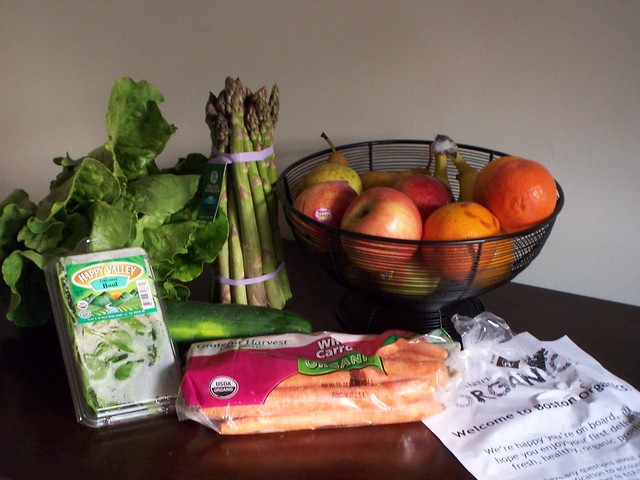6.01.2011
adding "green" via Boston Organics
CSA (community supported agriculture) subscriptions are popular in Boston. And we were very interested. Buying a share in a local farm and enjoying farm-fresh food all summer sounded like a sweet deal. Unfortunately, all the ones nearby didn't have pick-up times that worked with our schedule, and we weren't sure we wanted to commit to the possibility of massive amounts of kale and a ZipCar rental every two weeks. After all, it's just the two of us — could we eat it all?
Then our friend Amanda introduced us to Boston Organics. We signed up, and for $29 every two weeks, we get a small box of produce, perfect for two people. Unlike a CSA, we can put it on hold if we're out of town. We signed up for a half veggie half fruit box, and like a CSA, the exact mix is a surprise every time. They locally source as much as possible, and everything is organic. (You can also sign up for an all-local mix, but Amanda said it's more veggie heavy, and I'm a fruit girl.)
We feel good about this decision, but realize making green choices can be complex. Local isn't always eco-friendly when you factor in additional CO2 emissions for smaller delivery batches (thanks Dad, for sharing the article). So you drive more to pick up your CSA. They might drive more to make deliveries. But what if you have a hybrid? What if they do? And do the green farming practices used by CSAs offset the additional miles? Where do you factor in the health benefits of food with less chemicals? Is my desire for fruit while living in New England increasing air pollution, or do the efficient large-delivery supply chains make it work out the same?
We don't have the answers to these questions. But we do know our new Boston Organics food subscription is an extra boost to our efforts in a healthy diet. And a more plant-heavy diet is better for the environment. We're indirectly supporting local farms. It's all organic — also good for us and the planet (and for the people who live where the food is grown, even if it isn't fair trade). And Boston Organics cares about the environment: they plan deliveries to maximize efficiency, recycle and compost, and place orders to minimize waste.
Our best option is to support companies that share our values, and to keep learning. More knowledge means better choices. And better choices mean happy planet.
How do you add "green" to your food?

